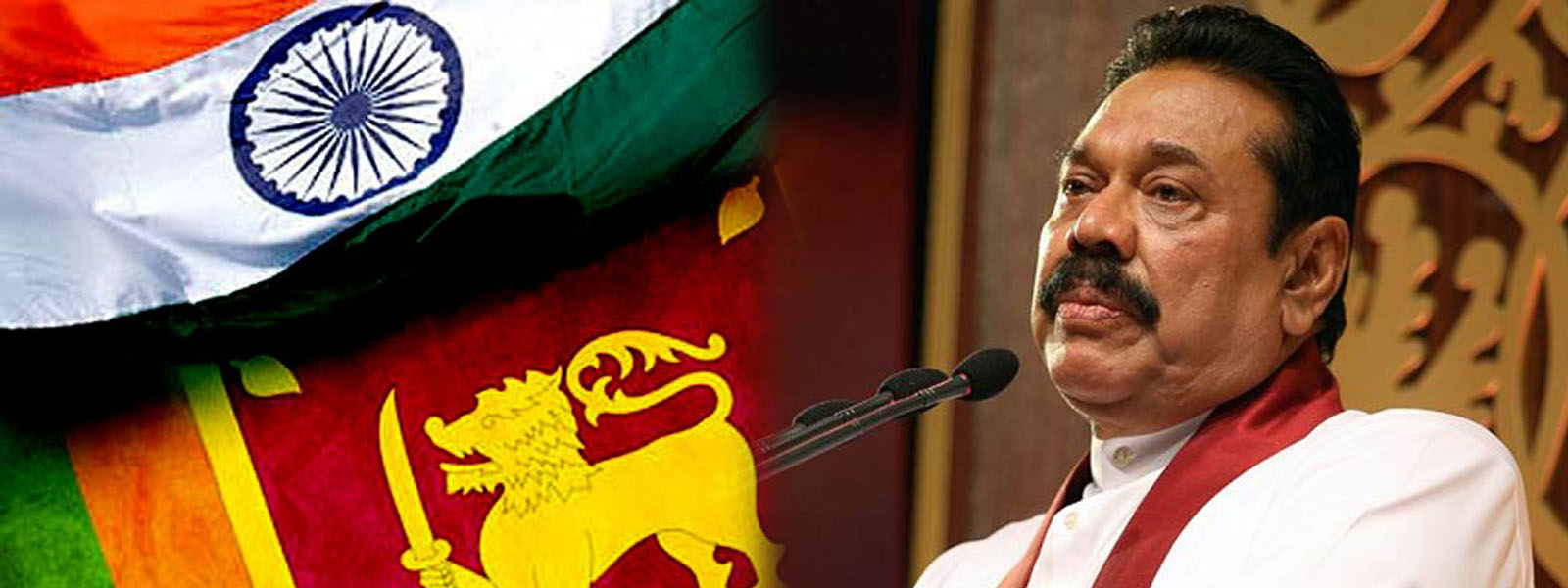.webp)

How India became our relative
COLOMBO (News 1st)
With the much ado on the 20th amendment coming into play, the former President has an opportunity to become the executive Prime Minister.
Due to the 20th amendment being discussed, it seems that the former President needs new friends.
Sri Lanka being a geo-politically strategic location, it is easy to make friends and even carry out deals and ask for aid.
The former president who blatantly defended China's presence in Sri Lanka in 2015 has now, changed his tune stating that "China is a friend but India is our relative."
Before the election in 2015 through which President Maithripala Sirisena came into power, Mahinda Rajapaksa made many deals with Chinese authorities for infrastructure in Sri Lanka.
It was public knowledge that the previous regime was very fond of China and that China reciprocated the feelings by granting aid for all the projects.
China continues to be good friends with the current government even after the administration attempted to break away from China.
Sri Lanka a Geo-politically strategic location
The $1.4 billion Port City project in Colombo by China Communication Construction Company (CCCC) started in 2016. This was a part of Beijing’s plans to create a modern-day “Silk Route” linking Asia to the Middle East and Europe.
The Hambantota port project done by the China Harbour company was done on the request of the former President, and it has now been leased to China on a 99-year deal, as Sri Lanka was not able to repay the loan.
Mahinda Rajapaksa kept lobbying China. Even after the government change, Sri Lanka continues ties with China due to the deals already made.
Did RAW interfere in Sri Lanka's politics?
After the Presidential election in 2015, the defeated candidate Rajapaksa gave a statement to the Hong Kong-based South China Morning Post saying "It was very open, Americans, the Norwegians, Europeans were openly working against me. So was RAW (India's Research Analysis Wing)". On 18 January 2015 Reuters reported, after the election that the Colombo station chief for RAW, K. Ilango, was recalled to New Delhi before the election, following complaints by the Sri Lankan government that he was helping the opposition parties. The same Reuters article cited an Indian official who said the then Sri Lankan defence secretary, Gotabaya Rajapakse, complained about “the agent’s activities to Indian National Security Adviser Ajit Doval” when Doval visited Colombo in late November to attend a defence seminar. After Doval’s return to New Delhi, the RAW station chief was recalled. During his visit, Doval not only met with Mahinda Rajapakse and his brother Gotabaya but also with Wickremesinghe, Sirisena and Kumaratunga. No details were reported, it did raise concern as to whether Doval discussed India’s concerns over Rajapaksa’s government, as well as the opposition’s election plans. According to Reuters sources, the agent also played a role in convincing Wickremesinghe not to stand against Rajapaksa, in order to make way for “someone who can win.”The tipping point
An Indian security official told Reuters “The turning point in the relationship was the submarines. There was real danger.” India was apparently “stunned” when Chinese submarines docked twice in Colombo in September 2014. However, when Mahinda Rajapaksa was questioned by the South China Morning Post if the docking of two Chinese submarines in Sri Lanka had raised India's hackles, he stated "The Chinese president was here, so the subs were here. Find out how many Indian submarines and warships came to our waters when the Indian prime minister came for SAARC in 2008” He further told the South China Morning Post that Sri Lanka's new government is being unfair to China by unnecessarily dragging it into domestic politics; "They should be thankful to China for the help they extended; instead these people are treating China like a criminal."Why the change of heart Mr. Rajapaksa?
On 25 June 2018 New York Times published an article which revealed that Mahinda Rajapaksa had received 7.6 million USD from China Harbour Engineering Company, which was involved in the Hambantota Port Development Project. (How China Got Sri Lanka to Cough Up a Port) This article was written by the NYT South Asian correspondent living in Delhi, Maria Abi-Habib. The former President was outraged by the NYT article and this raised concerns of the public and could be said was an eye-opener to Sri Lankan's. However the chaos surrounding the article died down. After 2 months following the article, India's Bharatiya Janata Party, Dr. Subramanian Swamy visited Sri Lanka in August. He met with the former President Mahinda Rajapaksa at Medamulana. In a tweet, the former president Rajapaksa announces that he is invited to attend an event in India, “I welcomed my good friend Dr. Subramanian Swamy and I’m honoured to accept his invitation to speak in New Delhi,” On 10 September Mahinda Rajapaksa visited India to attend an event by the Virat Hindustan Sangam, where he addressed a public meeting on 12 September on “Indo-Srilanka Relations". On the day Rajapaksa was due to arrive in India, Dr. Subramanian Swamy tweeted "Today Fmr President of Sri Lanka and probably the next President is arriving in New Delhi..." According to how the events have unfolded, India seems to be predicting the future of Sri Lanka. The former president who blatantly defended China's presence in Sri Lanka in 2015 has changed his heart stating that China is a friend but India is our relative. The reason for the former Presidents change of heart is quite ambiguous. And that is how, India became our relative.Other Articles
Featured News





.png )

-797273_550x300.jpg)























.gif)